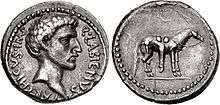Quintus Labienus
Quintus Labienus Parthicus (died 39 BC), the son of Titus Labienus, was a Roman republican general, later in the service of Parthia. After the then main political power in Rome, Julius Caesar, was murdered by a conspiracy in 44 BC, Labienus took the side of the pro-republic conspirators, led by Brutus and Cassius, the latter of whom he served in the capacity of an ambassador to the Parthians. After Brutus and Cassius fled east to Macedonia and were defeated there in the Battle of Philippi by Caesar's imperialist successors (the Second Triumvirate, particularly Mark Antony and Caesar's heir Octavian, the future emperor Augustus), Labienus joined the Parthians. [1] [2]

The Parthians invaded the Roman territories in 40 BC, led by Pacorus and Labienus. The Parthian army crossed the Euphrates and attacked Apamea. The attack on Apamea failed but Labienus was able to entice the Roman garrisons around Syria to rally to his cause. The combined Romano-Parthian army then proceeded to defeat Mark Antony's governor L. Decidius Saxa in a pitched battle and took Apamea. After the Roman defeat at Apamea, the Parthians split their army. Pacorus turned south and conquered the Levant from the Phoenician coast through Palestine. Labienus turned north to follow Saxa, whom he defeated and killed in Cilicia.
The initial success of Labienus was aided by the fact that the man who was directly responsible for that part of the Roman empire, Mark Antony (Marcus Antonius) was at first distracted by his dalliance with Cleopatra, the queen of Egypt, according to Plutarch's "Life of Antony". Then, when he finally got around to taking matters more in hand, Antony only got as far as Phoenicia, before he again became distracted, this time by his wife Fulvia, who was in some distress (together with his brother Lucius), due to the current state of affairs: her husband's extended stay in Egypt and her failed struggles against Octavian, the paramount power in Rome. So, at his point Antony turned his attentions to other matters of the empire, but did turn handling his Labienian and Parthian problem over to his lieutenant Ventidius, while Labienus and his Romano-Parthian army proceeded to conquer the rest of Asia Minor.
Under Labienus and Pacorus, the Parthians restored their territory to nearly the limits of the old Achaemenid empire and controlled all of Asia Minor except for a few cities but the Parthian successes were not long-lasting. In 39 BC, a Roman counterattack under Publius Ventidius in Asia Minor defeated Labienus, who was subsequently captured and executed. One year later Pacorus too was killed in Syria.
See also
References
- ↑ Morello, Antonio (2005). Titus Labienus et Cingulum, Quintus Labienus Parthicus Volume 9 of Nummus et historia. Circolo numismatico Mario Rasile.
- ↑ "Coins of Rome about Parthia: Quintus Labienus (42-39 B.C.)". Retrieved 5 February 2013.